Dentures – South Portland, ME
A Traditional Fix for Tooth Loss

As you might know, things get tricky when you’re missing teeth. Many everyday tasks are hard without a full smile. Lacking pearly whites can also lead to various oral health issues. Luckily, you can always trust the traditional fix for tooth loss: dentures! At Mind Your Mouth, these dental prosthetics will make your smile whole and pretty. They’d thus improve your quality of life! To learn more, just keep reading or book a consultation today!
Who’s a Good Candidate for Dentures?

Truthfully, almost anyone can qualify for dentures. Good treatment candidates simply need to suffer from tooth loss or similar ailments. That said, you should still consult Dr. Parét about care. She and her team will assess whether dentures suit you. Even if they don’t, you can always qualify later with preliminary procedures. You’re also free to try our other tooth replacement options. For more details, just keep reading or call our office directly!
Effects of Missing Teeth
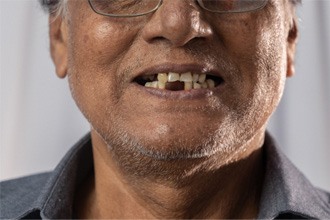
As you consider dentures, review tooth loss’s causes and effects. By doing so, you’ll better grasp how treatment can help.
People can lose teeth for a wide variety of reasons. One example is gum disease, which erodes the tissue supporting your pearly whites. Tooth decay is another, as it can rot teeth until they fall out or need pulling. Some patients could even get their teeth knocked out due to injuries or accidents.
Meanwhile, tooth loss effects are narrower but more severe. An especially big one is how missing teeth make eating, speaking, and smiling hard. A lack of pearly whites also causes smile gaps, leading to the erosion of your jawbone. (Said erosion causes facial collapse when left untreated.) Adding insult to injury, the same gaps may force your other teeth to tilt and fall out.
What Qualifies You for Dentures?
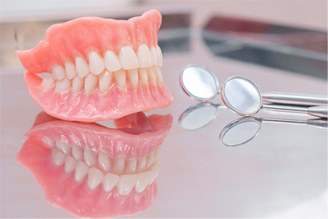
As stated before, tooth loss typically qualifies someone for dentures. Still, there are other factors worth your consideration.
For instance, just look at your oral health. Dentures won’t work well if your mouth is in poor shape. When your gums and jaw tissues are too weak, they can’t support the prosthetics. On the other hand, sensitive or decayed teeth won’t disqualify you – dentures can replace such things!
The number of lost teeth is also relevant. Depending on how many are gone, a dentist will suggest one of two possible dentures. The first is the partial kind, which only replaces a few teeth. In contrast, the second is the full denture that replaces all teeth along an arch.
One’s budget is also something to weigh. You see, dentures tend to be the cheapest restorations available. Therefore, they’re ideal for patients who operate on limited funds.
Alternative Tooth-Replacement Options
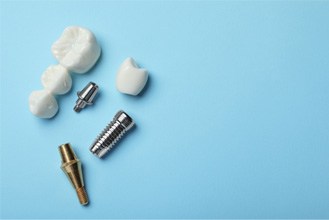
Even if you’re not a good denture candidate, you have other options. We at Midn Your Mouth offer several other restoration choices. The most notable of these are:
- Dental Bridges – A dental bridge is a fixed restoration, replacing only a few chompers and using nearby teeth for support. It typically comprises crowns fused to a pontic (i.e., an artificial tooth).
- Dental Implants – Dental implants are set in your jaw, unlike dentures or bridges. They thus fuse with your jaw to act as replacement tooth roots. From there, they become secure and permanent parts of your mouth. (Note, though, that these traits make implants a tad pricey.)
<Learn More About Dental Bridges>
Types of Dentures

During the consultation, Dr. Parét will outline the types of dentures we offer. She’ll then suggest one of three possible kinds for you. These options include the following:
Partial Dentures
Per its name, a partial denture only replaces a few chompers. It thus secures itself with metal clasps that attach to nearby teeth.
Aside from artificial teeth, a partial denture includes an acrylic base. This latter part is gum-colored to ensure seamless results. It typically fits snugly, though poorly-made dentures can feel loose.
Full Dentures
Unlike a partial model, a full denture replaces a whole arch of teeth. That means it relies on suction to stay in place. As a result, the appliance doesn’t alter your remaining teeth much (if at all).
Like a partial denture, a full one has an acrylic, gum-colored base. Said base does have one major difference, though. Namely, a lab further customizes it to fit across an entire arch.
Implant Dentures
An implant denture is best for patients who want a stable restoration. In particular, it suits those who don’t want a less traditional solution.
To be specific, implant dentures use dental implants — replacement tooth roots. As these roots fuse with your jaw, they keep your face from sagging or collapsing. More crucially, they ensure your new teeth won’t slip or fall from your mouth.
The Benefits of Dentures

Avoiding tooth replacement will only cause more problems to develop over time. There is evidence that links tooth loss to systemic issues such as osteoporosis, diabetes, and heart disease. The longer you wait to seek treatment, the greater your risk for bone loss and additional tooth loss. By choosing to move forward with a dental bridge, you can expect there to be many great benefits, such as:
- A Lifelike Smile – With modern dental technology, current dentures look and act like natural teeth. They’ll blend seamlessly with their surroundings to produce beautiful results.
- Easier Eating – Whether they’re implant-based or not, dentures help you chew food. They’ll thus expand your dietary choices and improve your nutritional health.
- More Confidence – Quality dentures tend to boost your confidence by filling in your smile gaps. You’ll then feel more comfortable among friends and family.
- Long-Lasting Results – Given the proper care, dentures can last 10-15 years or more!
How Dentures Are Made

The process of creating dentures requires time, effort, and patience on your part as well as that of the dentist and lab technician. Customized according to the impressions taken of your mouth and the specifications provided by our team, these prosthetics are carefully crafted so that they fit comfortably and allow you to eat and speak without worry. By learning how dentures are made, you can develop a deeper appreciation for your new smile – one that will spur you to maintain it year after year.
What Are Dentures Made Of?
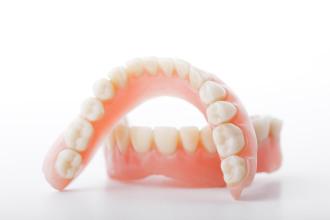
Two components make up a denture – the base and the artificial teeth. The base commonly consists of acrylic because of how easy it is to color-match it to the shade of your gum tissue. Its purpose is to support the artificial teeth that are attached to it, helping to create a natural-looking smile.
Artificial teeth are often made out of resin or porcelain because of their unique ability to mimic the look of natural tooth enamel. Porcelain is generally more popular, though, because of how it feels and its optimal durability.
The Denture Creation Process
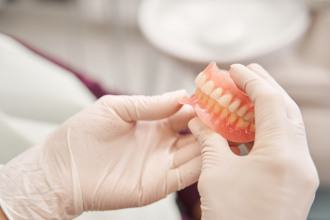
From start to finish, the denture creation process can take weeks or even a few months depending on whether you need a partial, a single denture, or a full set. It requires multiple steps, each of which must be completed successfully before moving on to the next.
After capturing an impression of your gums, we will measure your jaw and send it to a dental lab, where technicians will create a wax mold of your gumline. Artificial teeth are then placed onto the base before excess wax is removed to create a more natural gum shape.
We will receive the wax mold and perform a fitting. If you and our team approve, they will be sent back to the lab, and you will wear temporary dentures in the meantime.
A technician will boil the dentures to remove any wax before filling a flask with plaster that will hold the shape of your dentures. They will then be melted before small holes are created in the teeth, allowing the new material to properly attach. To keep the acrylic from sticking, a liquid separate will be added. Acrylic will then be injected into the flask to replace any wax.
Once the plaster is removed, the acrylic dentures are placed in an ultrasonic bath before the excess acrylic is trimmed off. With a final polish, they will be delivered to our office so that you can undergo your final fitting.
Adjusting to Your New Dentures

It is normal to experience some slight discomfort after having your dentures put into place. Some mild soreness is common, and you may find it difficult to eat or speak initially. However, as your mouth begins to adjust to the foreign object, it will begin to feel like natural teeth. During this adjustment phase, you can speed up the process by eating soft foods, exercising your facial muscles, and trying denture adhesive. If you continue to notice any discomfort, don’t hesitate to reach out to our office.
Understanding the Cost of Dentures

The cost of dentures depends on a few factors. During your consultation, Dr. Parét and our team will be able to share some specific numbers with you and talk to you about your payment options. Dentures are one of the most cost-effective forms of tooth replacement, and most patients are able to manage the financial side of their treatment without too much stress.
Factors that Affect the Cost of Dentures
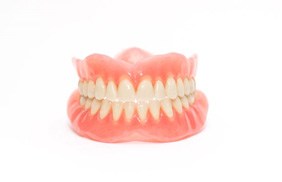
Some factors that can have a bearing on the cost of dentures include:
- Preparatory treatment. Some patients require tooth extractions, gum disease therapy, or other procedures before they can move ahead with tooth replacement.
- Dentures usually consist of an acrylic base along with porcelain or acrylic teeth. The prices for these materials can vary depending on their quality, their manufacturer, and more.
- The type of denture. Full dentures, partial dentures, and implant dentures all have different price points.
Keep in mind that quality is important for what goes in your mouth! You should be wary of any deals that you come across for “cheap dentures.”
Are Implant Dentures More Expensive?
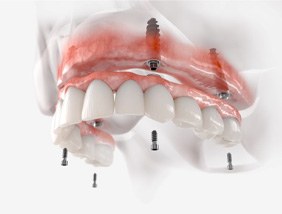
Yes, implant dentures cost more than their traditional counterparts. That is because the treatment process requires more time, effort, materials, and skill than what is involved with regular prosthetics. Are implant dentures worth their higher price? Most patients would say yes. Not only are they extremely sturdy and lifelike, but they also last a long time. In fact, dental implants can last for decades, whereas a traditional denture may need to be replaced every 5 – 7 years. Therefore, implant dentures may actually present a better long-term monetary value.
Does Dental Insurance Cover Dentures?

In most cases, yes, dental insurance does cover dentures. Most insurance companies classify this treatment as a major procedure, so around 50% of its cost might be covered, up to the amount of your plan’s annual maximum. Our practice welcomes insurance; we are even in-network with Delta Dental! We will be happy to help you figure out how you can use your benefits in your office and file all necessary forms on your behalf.
Other Options for Making Dentures Affordable

Aside from insurance, there are a few provisions that may make it easier for you to afford dentures:
- We welcome third-party financing through CareCredit. Most patients are quickly approved for a payment plan that works with their budget.
- In-house membership plan. Our Mindful Dental Membership plan is designed for patients without insurance. It can allow you to enjoy a discount on virtually all the services available in our practice.
Would you like to learn more about dentures and their cost? Our team is eager to answer your questions. Get in touch with us today to book a consultation.
Dentures Aftercare
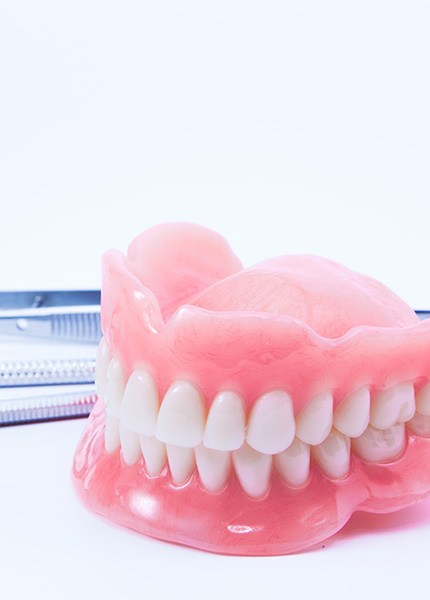
Your new dentures have the power to improve your life by completely transforming your smile’s appearance and functionality. However, even if you have no natural teeth remaining, you must continue to maintain your dental well-being. Because your prosthetics are pressed against your gums all day, bacteria can thrive and cause oral issues like gum disease, which can affect your jawbone if left unaddressed. That means caring for your restoration correctly is essential to keeping your mouth happy and healthy.
Continue reading to learn a few helpful tips from for keeping your dentures in tip-top shape to support your oral condition, and feel free to contact us for more information.
Removable Dentures
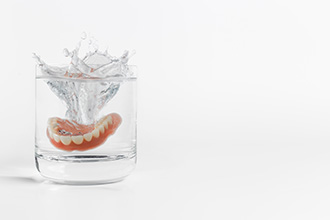
Remove After Eating
Little pieces of food you’ve eaten are prone to clinging to your artificial teeth. Over time, this can create a layer of plaque that can cause gum disease and leave your dentures smelling unpleasant.
To keep them fresh after meals, remove them and gently rinse them under running water for a few moments. Remember to use a cool or lukewarm setting because overly hot temperatures can warp the acrylic, causing your prosthetics to no longer fit.
Clean Your Restoration
Some patients wonder if they can brush their dentures in their mouths, but doing so means that you’re not washing all their surfaces for a thorough cleanse. Instead, you should remove them twice daily (morning and night) to gently brush them with a soft-bristled toothbrush and mild dish soap or special cleanser. Standard toothpaste can be abrasive on the materials, so try to avoid it. Then, floss them to remove any plaque or food debris.
When you’re done, rinse them thoroughly so you don’t put toxic cleaning materials or soap into your mouth.
Keep Your Dentures Safe
Your restoration can become slippery when you wash it, and if it tumbles out of your fingers, it can become chipped, cracked, or broken. Try placing a soft towel beneath you during cleanings so that they land on a softer surface if they take a fall.
Also, try to store them out of the reach of small pets and children who might not handle them very carefully.
Remove Dentures When You Sleep
Your dentures rely on a tight suction against your gums to remain firmly in place, which can strain the tender tissues or cause sores to develop. To give them a break, you should take them out of your mouth to sleep at night.
Placing them in a glass of water or a special cleaning solution overnight can eradicate up to 99% of unwanted germs. This method also ensures they stay moist to retain their shape, preventing the acrylic from drying out and cracking.
Notice Changes
It’s important to pay attention to your dental condition to spot early indicators of potential problems before it’s too late. For example, if you notice that your gums look redder or more inflamed than usual, you can call our team to schedule an appointment to check for gum disease.
Also, if you see signs of wear and tear or damage to your dentures, don’t attempt to fix them at home. Many household substances, like super glue, are toxic and shouldn’t be placed on oral devices or in your mouth. Our team has the experience and equipment to repair or replace your restoration safely.
Dentures FAQs
What type of denture adhesive should I use?
You can choose from multiple different types of denture adhesive. The best one will be the one that you like to use the most! Below, we’ve outlined the different types of adhesive you can purchase alongside their pros and cons:
- Creams: Adhesive creams will provide you with reliable, all-day hold and help prevent food from becoming trapped between the prosthetic and your gumline. They’re also a great option if you have gum sensitivity. However, they can be a little messy to use while you’re still learning how much you need for a good hold
- Powders: Adhesive powders also offer reliable hold that can last for up to 12 hours. It’s easy to sprinkle but can be messy.
- Strips: Lastly, denture adhesive strips are simple to use and drastically less messy than their cream and powder counterparts. Because they’re pre-cut to fit your denture, you won’t have to worry about applying too much adhesive. However, they aren’t able to seal out as much food debris.
My dentures feel like they don’t fit right. What should I do?
If you’ve had your dentures for several years now and feel like they don’t fit like they once used to, it may be time to get them either relined or replaced. Using ill-fitting dentures can put you at a higher risk of developing oral sores and infections, which is why our team recommends keeping a close eye on your oral symptoms to make sure your dentures continue to function well and remain comfortable.
Can I sleep with my dentures?
If you have full traditional dentures, it’s important that you take them out before bed and store them in a glass of room temperature water. This will help them maintain their shape as well as give your gums much-needed rest, allowing blood flow to return and preventing irritation. If you have partial dentures, it’s still a good idea to give your gums a rest by taking them out and storing them in their hard protective case. For those with implant dentures, removal isn’t necessary since they’re permanently affixed within the mouth.
Is it hard to talk with dentures?
It can be difficult to talk with dentures in your mouth at first, as you’re still getting use to the way they feel. However, after about 30 days, you should feel much more confident speaking. To speed up this adjustment period, our team recommends practicing reading aloud to yourself and even talking to yourself in the shower or while you’re cleaning!
Are there any foods I should avoid eating with dentures?
Dentures don’t restore your bite force completely, which is why we recommend being mindful of the foods that you eat. If you’re eating chewy proteins like chicken or steak, be sure to cut them into smaller, easy-to-chew pieces. We also recommend avoiding foods that are excessively crunchy or chewy.

